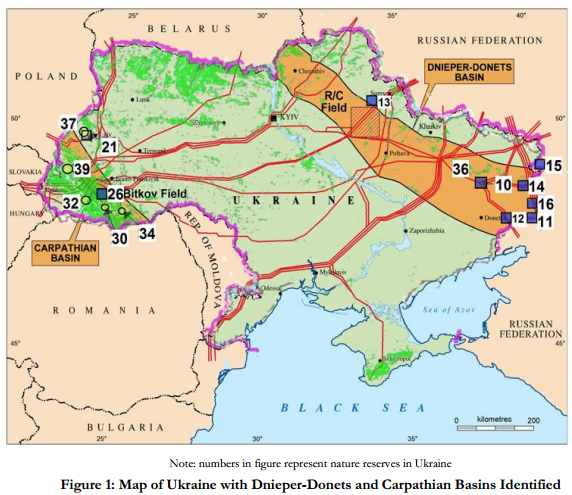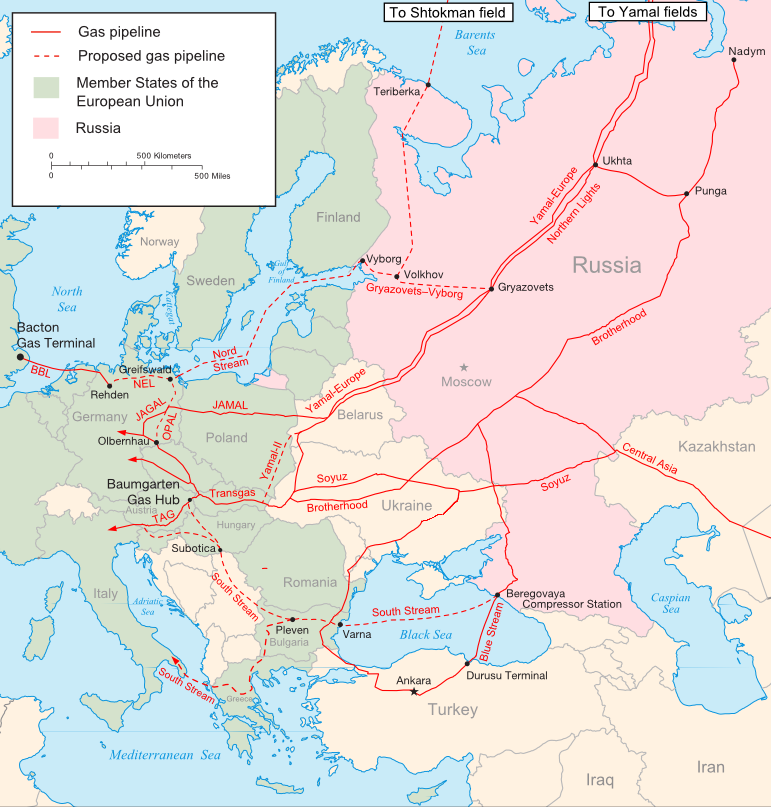About a year ago I penned some blog posts about the shale gas fracking deals which were made by Ukraine during 2013, prior to the revolution which ousted then-President Yanukovych. There are large shale deposits in Eastern Europe, in Ukraine, Romania, Poland and the Baltic Countries, which are believed to be frackable. The Western Powers were hoping to be able to frack those shale deposits, extract natural gas, and thereby buy some freedom from Russian domination – because otherwise Russia will be Europe’s primary supplier of natural gas and it’s widely thought Russia will use that dominance to extract every ounce of whatever it can. Therefore, part of the justification of the Ukraine Revolution may have been ensuring Ukraine’s shale fields could be fracked to produce that geo-power-game-result.
There are two segments to Ukraine’s shale fields – the Western half was to be exploited by Chevron – the Eastern half by Royal Dutch Shell.
According to several reports today (Rig Zone![]() , Kyiv Post
, Kyiv Post![]() , Financial Times), Shell has announced their intention to pull out of their commitment in Eastern Ukraine. The reason is pretty obvious – the region they were to work in, Donetsk and Kharkiv Oblasts, have been the site of bloody battles between Ukraine’s, Separatists, and Russian forces since the Revolution.
, Financial Times), Shell has announced their intention to pull out of their commitment in Eastern Ukraine. The reason is pretty obvious – the region they were to work in, Donetsk and Kharkiv Oblasts, have been the site of bloody battles between Ukraine’s, Separatists, and Russian forces since the Revolution.
According to the Kyiv Post report, Ukraine’s government received a “Notice of Withdrawal” from Royal Dutch Shell. It cited “circumstances beyond the company’s control” and that the company has been “prevented from performing its commitments under (the) Yuzivska production sharing agreement” and that they have “begun discussions with the Ukrainian government and our partner Nadra Yuzivska LLC on the way forward with the PSA, pursuant to its terms.”
Last summer Shell declared “force-majeure” due to the fighting in Donetsk and Kharkiv Oblasts. The agreement had been signed between Shell and Ukraine’s government in January 2013.
According to Kyiv Post, the 360 page agreement had been released by Ivan Varchenko, a Kharkiv city councilman, on Jan 25, 2013. Shell was obligated to make several payments to the State at different stages of the process leading to production of natural gas.
The same report says that Chevron had earlier notified Ukrainian officials that it too would be pulling out of natural gas exploration. That was part of a larger pullout by Chevron from several countries, including Romania, which I reported on earlier.
In May, a UK company, JKX Energy, which had been awarded some contracts to develop Ukrainian shale fields, announced it was pulling out of Ukraine![]() . Their decision wasn’t due to the fighting, but JKX Chief Executive Paul Davies said in a statement. “we have been forced to suspend drilling operations in Ukraine because of the current punitive levels of production tax and restrictive currency controls.”
. Their decision wasn’t due to the fighting, but JKX Chief Executive Paul Davies said in a statement. “we have been forced to suspend drilling operations in Ukraine because of the current punitive levels of production tax and restrictive currency controls.”
According to FuelFix, Gazprom is being stymied in a plan to frack some fields in Western Siberia because the U.S. Sanctions on Russia prohibit exporting fracking technology to Russia.
According to OilPrice, Gazprom has announced that after 2019 none of Gazprom’s natural gas shipments to Europe will traverse Ukraine’s territory![]() .
.
This map shows the reason why this is important. Ukraine has the majority of the natural gas pipelines connecting Russia with other parts of Europe. Over the last 10-15 years disputes between Russia and Ukraine have several times caused natural gas shipments to Europe to be interrupted. This map shows several proposed pipelines that would, if built, bypass the pipelines in Ukraine and reduce Ukraine’s strategic position in controlling the flow of gas to Europe.
Nord Stream has been built. The South Stream project has been canceled, but the OilPrice article names a different project named “Turkish Stream” that could go from Russia, through Turkey and into Greece. But other parties are interested in a different project, the Trans-Anatolian Pipeline (TANAP) which would bring Azerbaijan’s natural gas to market in Europe.
The European Union has also brought an antitrust case against Gazprom, because that company (widely believed to be a tool of Russia’s foreign policy) is charging different rates to different countries depending on their cooperation with Russia on unrelated matters.
According to Oil & Gas Eurasia, Ukraine is seeking a deal with Russia/Gazprom on buying natural gas so the country can replenish its stocks before the Winter![]() . Ukraine is dependent on Russia for 50% of its natural gas supply.
. Ukraine is dependent on Russia for 50% of its natural gas supply.
- The USA should delete Musk from power, Instead of deleting whole agencies as he demands - February 14, 2025
- Elon Musk, fiduciary duties, his six companies PLUS his political activities - February 10, 2025
- Is there enough Grid Capacity for Hydrogen Fuel Cell or Battery Electric cars? - April 23, 2023
- Is Tesla finagling to grab federal NEVI dollars for Supercharger network? - November 15, 2022
- Tesla announces the North American Charging Standard charging connector - November 11, 2022
- Lightning Motorcycles adopts Silicon battery, 5 minute charge time gives 135 miles range - November 9, 2022
- Tesla Autopilot under US Dept of Transportation scrutiny - June 13, 2022
- Spectacular CNG bus fire misrepresented as EV bus fire - April 21, 2022
- Moldova, Ukraine, Georgia, Russia, and the European Energy Crisis - December 21, 2021
- Li-Bridge leading the USA across lithium battery chasm - October 29, 2021

















